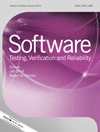
SOFTWARE TESTING VERIFICATION & RELIABILITY
Scope & Guideline
Advancing Software Reliability with Cutting-Edge Insights
Introduction
Aims and Scopes
- Software Reliability and Quality Assurance:
The journal emphasizes research on methodologies and models aimed at predicting and enhancing software reliability. This includes studies on fault tolerance, reliability prediction models, and quality assurance frameworks. - Testing Methodologies and Techniques:
A significant portion of published work focuses on various testing methodologies such as model-based testing, metamorphic testing, and mutation testing. These methodologies aim to improve the effectiveness and efficiency of software testing processes. - Automation and Tool Development:
The journal features research on automated testing tools and frameworks that facilitate various testing processes, including automated test generation, test prioritization, and continuous integration testing. - Emerging Technologies in Software Testing:
Research that explores the application of emerging technologies, such as machine learning, deep learning, and artificial intelligence in software testing and verification is a key focus area, aiming to innovate traditional practices. - Application-Specific Testing:
The journal covers testing approaches tailored for specific domains like Internet of Things (IoT), autonomous systems, and virtual reality, addressing unique challenges and requirements in these fields.
Trending and Emerging
- Metamorphic Testing:
This theme has gained significant attention, particularly in the context of complex systems like autonomous vehicles and deep learning models, where traditional testing techniques may fall short. Researchers are exploring metamorphic relations to ensure reliability in unpredictable environments. - Machine Learning and AI Integration:
The integration of machine learning and artificial intelligence into testing methodologies is increasingly prominent. Papers are focusing on how these technologies can enhance automated test generation, fault detection, and predictive reliability modeling. - Testing for Autonomous Systems and IoT:
With the rise of autonomous systems and IoT devices, there is a marked increase in research dedicated to the unique challenges of testing these technologies, including safety, reliability, and performance under diverse conditions. - Deep Learning and Neural Networks Testing:
There is a growing body of work addressing the testing of deep learning models, particularly around uncertainty quantification and robustness testing, reflecting the increasing reliance on AI in software solutions. - Fuzz Testing and Vulnerability Detection:
Fuzz testing techniques are emerging as a critical area of focus, especially in the context of security and reliability for software applications, with researchers looking to enhance existing approaches to detect vulnerabilities effectively.
Declining or Waning
- Traditional Testing Techniques:
There has been a noticeable decline in papers focusing on conventional testing techniques that do not incorporate modern advancements, such as static analysis or manual testing methodologies, as the field moves towards more automated and intelligent approaches. - Non-Automated Testing Approaches:
Research centered around non-automated or semi-automated testing approaches is becoming less prevalent, possibly due to the growing emphasis on automation and the need for tools that can handle complex software systems efficiently. - General Software Testing without Specific Context:
Papers discussing general software testing concepts without a specific application context or case study are appearing less frequently, as the journal encourages more targeted and application-driven research. - Legacy Systems Testing:
Research focused on testing legacy systems has diminished, reflecting a trend toward modern development practices and the increasing adoption of contemporary software architectures.
Similar Journals
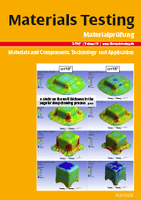
Materials Testing
Pioneering Innovations in Material PerformanceMaterials Testing is a renowned journal published by Walter de Gruyter GmbH, serving the global scientific community in the fields of Materials Science, Mechanical Engineering, and Mechanics of Materials. With an ISSN of 0025-5300 and an E-ISSN of 2195-8572, this journal has been a significant contributor to the discourse on material performance, testing methodologies, and engineering innovations since its inception. The journal is recognized for its rigorous peer-review process and holds a commendable Q2 quartile ranking in multiple categories for 2023, showcasing its impact and relevance in the field. With open access options available, Materials Testing aims to disseminate valuable research findings and practical insights that drive advancements in technology and materials applications. By addressing the latest challenges and developments within the field, this publication serves as an essential resource for researchers, professionals, and students alike, fostering a deeper understanding of material properties and testing techniques.
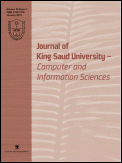
Journal of King Saud University-Computer and Information Sciences
Advancing Knowledge in Computer Science and ITJournal of King Saud University-Computer and Information Sciences, published by ELSEVIER, is a prestigious open-access journal focusing on the rapidly evolving fields of computer science and information technology. Since its inception in 1996, this journal has provided a platform for high-quality research and innovative ideas, promoting the dissemination of knowledge to a global audience. With a remarkable impact factor and ranked Q1 in the Computer Science (miscellaneous) category as of 2023, it stands among the top 11% of journals in its field, reflecting its commitment to excellence and relevance. The journal proudly carries the ISSN 1319-1578 and E-ISSN 2213-1248, and it is based in Saudi Arabia while being part of a global academic network. With a Scopus rank of #26 out of 232 in general computer science, the Journal of King Saud University-Computer and Information Sciences is an essential resource for researchers, professionals, and students seeking to stay at the forefront of technological advancement. As it continues to thrive through 2024, it invites contributions that will shape the future of computing and information sciences.
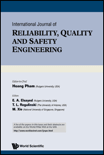
International Journal of Reliability Quality and Safety Engineering
Driving Progress in Engineering Reliability and QualityThe International Journal of Reliability Quality and Safety Engineering, published by World Scientific Publishing Co Pte Ltd, is a leading platform for disseminating cutting-edge research in the fields of reliability, quality, and safety engineering. With an impressive scope that spans across aerospace, electrical engineering, nuclear energy, and industrial manufacturing, this journal serves as a critical resource for researchers and professionals aiming to enhance system dependability and operational excellence. Indexed in Scopus, it holds a respectable Q3 ranking across various categories in 2023, reflecting its growing influence in the academic community. Although currently not open access, it provides ample opportunities for scholars to publish impactful studies from its extensive database, which has evolved since 1996. The journal's commitment to advancing knowledge in reliability and safety engineering makes it a pivotal resource for those dedicated to improving engineering practices and protocols worldwide.
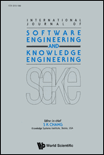
INTERNATIONAL JOURNAL OF SOFTWARE ENGINEERING AND KNOWLEDGE ENGINEERING
Empowering Engineering Minds with Cutting-edge InsightsThe INTERNATIONAL JOURNAL OF SOFTWARE ENGINEERING AND KNOWLEDGE ENGINEERING, published by WORLD SCIENTIFIC PUBL CO PTE LTD in Singapore, is a pivotal platform for disseminating cutting-edge research in the fields of software engineering and knowledge systems. With an ISSN of 0218-1940 and an E-ISSN of 1793-6403, this journal has been a reliable resource for scholars and practitioners since its inception in 1996. The journal is indexed across multiple prestigious databases, reflecting its relevance with a Category Quartile ranking of Q3 in both Computer Graphics and Computer Networks for 2023, and it maintains a steady trajectory of growth and scholarly contribution. Although not an Open Access journal, it is accessible through various academic institutions and libraries, ensuring researchers can engage with high-quality, peer-reviewed articles that explore advancements, theoretical developments, and practical applications in software and knowledge engineering. As it converges towards its end year of 2024, this journal continues to foster innovation and knowledge exchange, making it an essential resource for anyone invested in these dynamic fields.
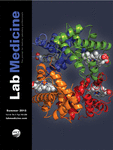
LABORATORY MEDICINE
Fostering excellence in laboratory diagnostics and research.LABORATORY MEDICINE, published by Oxford University Press, is a pivotal journal in the fields of biochemistry and clinical biochemistry, officially indexed under ISSN 0007-5027 and E-ISSN 1943-7730. Since its inception in 1973, it has provided a vital platform for the dissemination of high-quality research, facilitating scholarly communication and innovation in laboratory diagnostics and biochemistry practices. The journal is classified in the Q3 quartile for medical biochemistry and Q4 for clinical biochemistry, reflecting its commitment to enhancing the scientific community's understanding of laboratory science. With its quarterly publications and rigorous peer-review process, LABORATORY MEDICINE serves as an essential resource for researchers, professionals, and students alike, offering insights into the latest developments and methodologies in the field. As a part of a rapidly evolving discipline, the journal is not only dedicated to publishing original research but also aims to present reviews, case studies, and expert opinions that contribute to the advancement of laboratory medicine. In a global context, it emerges as a significant player, prioritizing accessibility, though currently maintaining a subscription-based model, facilitating informed research and clinical application.
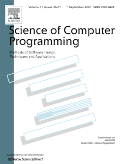
SCIENCE OF COMPUTER PROGRAMMING
Unveiling the Science Behind Software InnovationScience of Computer Programming, published by Elsevier, is a leading journal dedicated to advancing knowledge in the fields of computer programming, computational theory, and software development. With a focus on interdisciplinary research that spans computational methodologies, information systems, and simulation modeling, this journal plays a vital role in disseminating innovative findings and fostering collaboration among experts in these dynamic areas. With a respectable impact factor and ranked in various Scopus Categories such as computational theory (Q3) and information systems (Q2), it provides a platform for high-quality scholarly articles that push the boundaries of programming science. Although currently not open access, the journal offers invaluable insights for researchers, professionals, and students alike, ensuring they are equipped with the latest advancements and methodologies to thrive in an ever-evolving technological landscape. The journal covers research from its convergence starting in 1981 and continues to welcome groundbreaking contributions as it looks forward to an exciting future through 2025 and beyond.
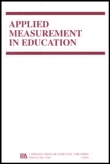
APPLIED MEASUREMENT IN EDUCATION
Advancing educational practices through rigorous measurement.Applied Measurement in Education is a prestigious journal published by Routledge Journals, Taylor & Francis Ltd, dedicated to advancing the fields of education and developmental psychology. Established in 1988, the journal has played a critical role in disseminating research and theoretical perspectives related to assessment, measurement practices, and educational outcomes. With an impressive standing in the academic community, it is categorized in the Q2 quartile for Developmental and Educational Psychology and the Q1 quartile for Education as of 2023. It ranks #654 out of 1543 in Social Sciences - Education and #203 out of 360 in Psychology - Developmental and Educational Psychology. Though not an Open Access journal, it provides essential insights for educators and policymakers wishing to harness measurement tools for improved educational practice. With a focus on empirical research, theoretical frameworks, and practical applications, Applied Measurement in Education serves as a vital resource for researchers, professionals, and students dedicated to enhancing the effectiveness and fairness of educational assessments.
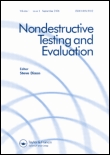
Nondestructive Testing and Evaluation
Elevating Standards in Nondestructive EvaluationNondestructive Testing and Evaluation, published by Taylor & Francis Ltd, is a premier international journal dedicated to the dissemination of innovative research and practices in the field of nondestructive testing and evaluation. With a robust ISSN of 1058-9759 and an E-ISSN of 1477-2671, this journal has consistently served as a vital resource for researchers, professionals, and students interested in enhancing the safety and reliability of materials and structures through advanced testing techniques. The journal's significant impact, evidenced by its Q2 rankings across multiple categories—including Materials Science, Mechanical Engineering, and Physics and Astronomy, along with commendable Scopus rankings—reflects its commitment to high-quality scholarship. Covering the convergence of research from 1989 to 2024, Nondestructive Testing and Evaluation plays a crucial role in advancing methodologies that drive innovation in various engineering disciplines. While currently not offering an Open Access option, the journal remains a respected platform for exchanging knowledge that shapes the future of nondestructive methodologies.

PROGRAMMING AND COMPUTER SOFTWARE
Advancing Software Development Through Rigorous ResearchPROGRAMMING AND COMPUTER SOFTWARE is a distinguished journal committed to advancing the field of software development and programming methodologies. Published by PLEIADES PUBLISHING INC, this journal has been a valuable resource since its inception in 1978, reaching out to researchers, professionals, and students alike. With an emphasis on rigorous peer-reviewed articles, the journal holds a Q3 ranking in the realm of Software according to the latest 2023 Category Quartiles. Though it does not offer open access, the journal ensures that high-quality research is disseminated to its audience, providing insights into evolving programming techniques, software engineering challenges, and innovative solutions. With its convergence of years extending to 2024, PROGRAMMING AND COMPUTER SOFTWARE remains a pivotal publication, fostering a deeper understanding of the complexities in computer programming while supporting the broader software community.

MATERIALS EVALUATION
Championing Reliability through Rigorous Evaluation.MATERIALS EVALUATION is a pivotal journal published by the American Society for Nondestructive Testing, focusing on the critical intersection of materials science and engineering practices. Established in 1970, this journal serves as a vital resource for researchers and practitioners interested in the nondestructive testing and evaluation of materials, contributing significantly to advancements in quality assurance and materials reliability. While it currently holds a Q4 classification in Materials Science (miscellaneous), Mechanical Engineering, and Mechanics of Materials, its longstanding history and commitment to disseminating important research make it an essential platform for those within the field. The journal is accessible through various academic libraries and subscription options, bridging the gap between theoretical research and practical applications, hence appealing to a broad audience of professionals and students alike. With opportunities for publication in an evolving field, MATERIALS EVALUATION remains an integral part of ongoing discussions and developments in materials assessment and nondestructive testing methodologies.